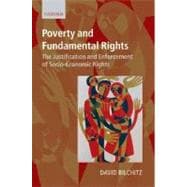
Note: Supplemental materials are not guaranteed with Rental or Used book purchases.
Purchase Benefits
What is included with this book?
| Table of Cases | p. xvii |
| Introduction | p. 1 |
| Towards a Thin Theory of the Good | |
| Introduction | p. 6 |
| Value and Point of View | p. 7 |
| Nussbaum and the Notion of a Human Life | p. 10 |
| Rawls and the Concept of the Person | p. 17 |
| Drawing Fact and Value Together: Experience and Purpose | p. 23 |
| In Defence of the Proposed Theory of Value | p. 30 |
| Judgements of Priority | p. 38 |
| Conclusion | p. 46 |
| The Justification of Fundamental Rights | |
| Introduction | p. 47 |
| The Presuppositions of Agency and Fundamental Rights | p. 47 |
| Nagel's Strategy: Impersonal and Personal Reasons | p. 53 |
| Equal Importance and the Justification of Fundamental Rights | p. 57 |
| Objections | p. 65 |
| Conclusion | p. 74 |
| Determining Our Unconditional Obligations | |
| Introduction | p. 75 |
| Unanswered Questions About the Content of Rights | p. 75 |
| Conditional and Unconditional Rights | p. 78 |
| Translating Conditional Rights into Unconditional Rights | p. 83 |
| The Assignment of Duties | p. 91 |
| The Overall Decision Framework | p. 98 |
| Conclusion | p. 100 |
| Justifying the Judicial Review of Fundamental Rights | |
| Introduction | p. 102 |
| Theories of Judicial Review | p. 103 |
| Disagreement, Rights, and Judicial Review | p. 108 |
| A Thin Rights-based Theory of Judicial Review | p. 115 |
| Reaching Optimal Decisions Concerning Fundamental Rights: The Judiciary or the Legislature? | p. 119 |
| Socio-Economic Rights and Judicial Review | p. 128 |
| Conclusion | p. 132 |
| Judicial Review in Practice: The Reasonableness Approach and its Shortcomings | |
| Introduction | p. 135 |
| Constitutional Interpretation in South Africa | p. 136 |
| Grootboom: Reasonableness and the Minimum Core | p. 139 |
| Treatment Action Campaign: Reducing Rights to Reasonableness | p. 152 |
| An Alternative Reading of the Jurisprudence? | p. 166 |
| Khosa: Reasonableness and the Confusion of Scope and Content | p. 170 |
| Conclusion | p. 176 |
| Political Philosophy in Action: Developing the Minimum Core Approach to Socio-Economic Rights | |
| Introduction | p. 178 |
| Linking Political Philosophy and Legal Doctrine | p. 179 |
| The Case for a Minimum Core Approach | p. 183 |
| Objections to the Minimum Core Approach | p. 197 |
| The Notion of Priority and the Minimum Core | p. 208 |
| Resources, Impossibility, and Rights | p. 215 |
| The Availability of Resources | p. 225 |
| Conclusion | p. 234 |
| Conclusion: Implications for Policy in South Africa and Beyond | |
| The Right to Food in the United States, India, and South Africa | p. 238 |
| The Right to Adequate Housing in the United Kingdom, India, and South Africa | p. 248 |
| Conclusion | p. 260 |
| Bibliography | p. 262 |
| Index | p. 273 |
| Table of Contents provided by Ingram. All Rights Reserved. |
The New copy of this book will include any supplemental materials advertised. Please check the title of the book to determine if it should include any access cards, study guides, lab manuals, CDs, etc.
The Used, Rental and eBook copies of this book are not guaranteed to include any supplemental materials. Typically, only the book itself is included. This is true even if the title states it includes any access cards, study guides, lab manuals, CDs, etc.